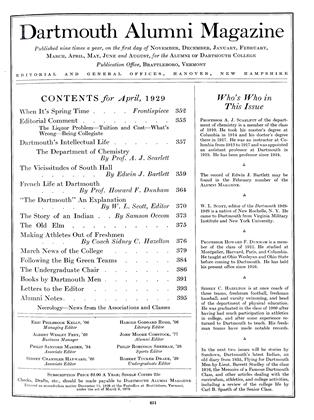A pastoral comedy in two acts; music by Franz Schubert; book by Alexander Dean '16. New York. Silver Burdett & Cos.
Schubert, the writer of songs, is a well known figure in the development of music. Schubert, as operatic composer, requires an introduction for the general reader. In the last decade of his short life, he had attempted the long and dramatic musical form which we classify as "opera." His reasons might well have been to gain a wide public through the medium of the theatre and even more important, to increase the meagre royalties which his songs brought him. His attempts were not successful; we have no Schubert in the operatic repertoire of today. However, some of his best known music is taken from a play with incidental music—Rosamunde von Cypern—after the story of Helmina von Chezy. The work was performed twice in 1823, and then because of its length, four acts of romantic pastorals proving too much for the theatre goer of a hundred years back, the piece was removed from the boards. The Chezy version of the story has been lost, the work is remembered by us because of the charm of the music, particularly the entr'acte and the ballet.
This brings us to the book in question, Professor Dean's version of the Rosamunde story, with the original musical text and additions from Schubert's songs. That the book is the result of much careful research there can be no doubt; that it is now presented in a more condensed and therefore acceptable form is sure to bring it to the attention of those who seek the type of entertainment usually classed as "operetta." Careful directions as to its production, clear costume sketches; careful division of solos among the cast; "singable" music for the chorus; presumably orchestrations of moderate difficulty; these added to a plot which has well-arranged dramatic passages, and a second-act climax should make Professor Dean's "Rosamunde" a "find" for the school music directors and the various little theatre groups.
The reviewer can not agree with the author concerning the inclusion of well-known Schubert songs as "Serenade" and "Ave Maria." These are art songs, each complete in itself, written for another milieu rather than the scenery and costumes of "Rosamunde." To some they might bring added interest when interpolated in the plot; to the reviewer they "just don't belong"—purely a matter of taste.
Nineteen-twenty-eight brought the centennial of Schubert's death. Schubert has become better known to us through the appearance of several books in that year. Surely Professor Dean with his resurrection of "Rosamunde" has increased our acquaintance with one of the most interesting of the Romantics.
 View Full Issue
View Full Issue
More From This Issue
-
 Class Notes
Class NotesCLASS OF 1923
April 1929 By Truman T. Metzel, "Charlie Chadbourne" -
 Article
ArticleThe Vicissitudes of South Hall
April 1929 By Edwin J. Bartlett -
 Lettter from the Editor
Lettter from the EditorEditorial Comment
April 1929 -
 Article
ArticleFrench Life at Dartmouth
April 1929 By Howard F. Dunham -
 Class Notes
Class NotesCLASS OF 1899
April 1929 By Louis P. Benezet -
 Article
Article"The Dartmouth," An Explanation
April 1929 By W. L. Scott, Editor
D. E. Cobleigh
Books
-
 Books
BooksAlumni Publications
January 1936 -
 Books
Books25TH REUNION.
JUNE 1967 -
 Books
BooksTHE LAST ADAM.
MAY 1967 By FRED BERTHOLD JR. '45 -
 Books
BooksFACULTY PUBLICATIONS
February 1925 By Hewette E. Joyce -
 Books
BooksDANIEL WEBSTER AND THE SALEM MURDER.
December 1956 By JOHN V. NEALE -
 Books
BooksMAKE YOUR OWN MOVIES. (FOR FUN AND PROFIT).
June 1939 By S. C. H.


